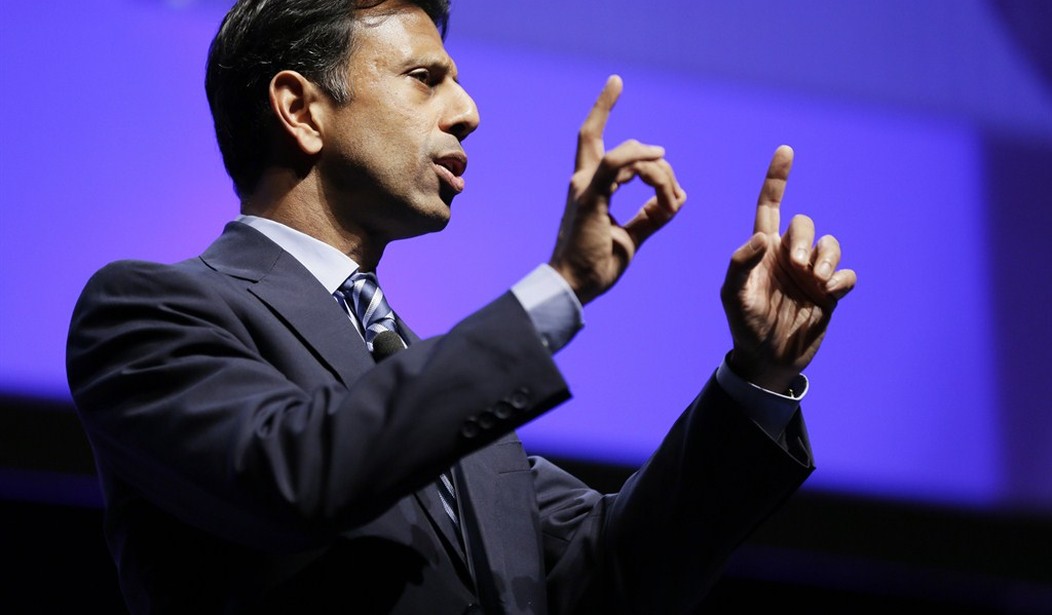A few months ago, Louisiana Gov. Bobby Jindal traveled to Washington to introduce a new national health care proposal. While there, he arranged to meet privately with a small group of conservative journalists and policy experts at the offices of the Ethics and Public Policy Center think tank.
Some of the experts engaged Jindal in debate about one of the plan's more arcane provisions. The back-and-forth between Jindal and his questioners went deep into the proposal's details, and it was soon clear that Jindal could dive as far into the health care policy weeds as any of the wonkiest wonks. He knew his stuff.
Jindal, a former assistant secretary of Health and Human Services, university president, congressman and two-term governor, knows more than just health care. It's probably safe to say there are few politicians who can equal or surpass his policy knowledge.
Now Jindal is getting ready to run for president. So far, he's not exactly taking the race by storm. Of the 10 candidates included in the RealClearPolitics average of polls for the 2016 Republican presidential race, Jindal is currently 10th, behind, in order of popularity, Chris Christie, Jeb Bush, Rand Paul, Paul Ryan, Ted Cruz, Rick Perry, Marco Rubio, Scott Walker and Rick Santorum.
Jindal is smart, experienced, full of ideas, a solid conservative. So why is he so far back?
First, he is still virtually unknown. To the degree that people outside of Louisiana know Jindal, it is for his poorly received -- OK, really bad -- Republican response to President Obama's first State of the Union address in 2009.
"He's an undervalued stock," says Jindal adviser Timmy Teepell. "The view of the pundit class in D.C., who have not seen Jindal on the stump or interacting with voters, is that he's an underdog without much of a shot. They take the simplistic approach -- 'The first time I heard of him he gave a bad State of the Union response, so he can't be any good.' Fortunately, D.C. pundits don't get to decide elections."
Recommended
Teepell points out that Jindal has won four elections in Louisiana -- two for the House and two for the governor's office -- all by decisive margins. When he makes his case to voters, he usually succeeds.
But all is not well at home for Jindal in his seventh year as governor. A poll released this week by PPP, a Democratic firm, pegged his job approval rating in Louisiana at just 34 percent, with 55 percent disapproval. (Other polls have also shown low approval ratings, although some have indicated recent improvement.)
In addition, PPP asked about hypothetical presidential matchups between Hillary Clinton and various Republicans in Louisiana. Bush, Cruz and Paul, as well as Mike Huckabee, all topped Clinton. Jindal, the favorite son, trailed Clinton by a single point, 45 percent to 46 percent.
If a Republican presidential candidate, no matter where he's from, has even a little trouble winning Louisiana, that's bad news.
Teepell points again to Jindal's election wins and explains that the governor "used the political capital from those victories to make much-needed reforms in Louisiana." The adviser ticked them off: government spending cuts, state work force cuts, income tax cuts, education reform, health care reform. They were all "massive undertakings that required a lot of political capital to be spent -- and when you spend political capital, you spend political capital."
In other words, Jindal's low ratings are the natural byproduct of his years in the arena, fighting to enact reforms that are not always popular. But once he steps onto the national stage, the theory goes, Jindal will be able to point to a record of real accomplishments.
He'll do that in the GOP primaries. Those contests, with a big and varied field, are a winnowing process. Candidates who looked good at the start can fade, and candidates who, like Jindal, are far back in the pack get a chance to move up.
Jindal is obviously ambitious (he is just 43, despite the long resume), but he can sometimes come across as wanting it too much. And when he makes a move that looks baldly political, as in his recent turn against Common Core, he only reinforces that impression.
Also, it's not clear that his deep policy knowledge is really the best equipment for a chief executive. Does Jindal see a big picture, a broad vision that will inspire voters? Or would he be better cast as secretary of Health and Human Services?
There's no question about Jindal's smarts and talent, and voters across the country haven't really seen him yet. They'll get their chance starting next year. Jindal will get his chance, too.
























Join the conversation as a VIP Member